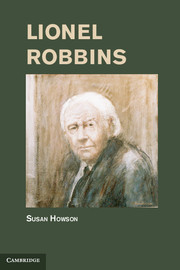Book contents
- Frontmatter
- Contents
- Illustrations
- Abbreviations
- Introduction
- One Father and Son
- Two The Great War
- Three Postwar
- Four The London School of Economics
- Five Iris Gardiner
- Six New College Oxford
- Seven The Young Professor
- Eight Fritz and Lionel
- Nine The School in the Mid-1930s
- Ten The Approach of War
- Eleven The Economics of War
- Twelve Director of the Economic Section
- Thirteen Anglo-American Conversations
- Fourteen The Law Mission and the Steering Committee
- Fifteen 1 9 4 4
- Sixteen The Last Months of the War
- Seventeen The Postwar Settlement
- Eighteen Return to the School
- Nineteen The End of the Transition
- Twenty LSE in the Early 1950s
- Twenty-One Chairman of the National Gallery
- Twenty-two Lord Robbins
- Twenty-three The Robbins Report
- Twenty-four The Sixties
- Twenty-five The Arts
- Twenty-six The Troubles at LSE
- Twenty-seven Retirement
- Conclusion
- Bibliography
- Index
Three - Postwar
Published online by Cambridge University Press: 07 October 2011
- Frontmatter
- Contents
- Illustrations
- Abbreviations
- Introduction
- One Father and Son
- Two The Great War
- Three Postwar
- Four The London School of Economics
- Five Iris Gardiner
- Six New College Oxford
- Seven The Young Professor
- Eight Fritz and Lionel
- Nine The School in the Mid-1930s
- Ten The Approach of War
- Eleven The Economics of War
- Twelve Director of the Economic Section
- Thirteen Anglo-American Conversations
- Fourteen The Law Mission and the Steering Committee
- Fifteen 1 9 4 4
- Sixteen The Last Months of the War
- Seventeen The Postwar Settlement
- Eighteen Return to the School
- Nineteen The End of the Transition
- Twenty LSE in the Early 1950s
- Twenty-One Chairman of the National Gallery
- Twenty-two Lord Robbins
- Twenty-three The Robbins Report
- Twenty-four The Sixties
- Twenty-five The Arts
- Twenty-six The Troubles at LSE
- Twenty-seven Retirement
- Conclusion
- Bibliography
- Index
Summary
The immediate postwar period was a time of hope and of disillusionment for Lionel Robbins as for many others in Britain. In the heady atmosphere of postwar optimism hopes of reform and reconstruction flourished. The Lloyd George coalition reelected in December 1918 promised a land fit for heroes to live in, reflecting the aspirations of the few remaining Liberals in the Conservative-dominated government. Many of the measures planned in the wartime Ministry of Reconstruction were begun in 1919. But after the breathing space of the demobilization period and a shortlived frenetic postwar boom in 1919–20 there came a severe and prolonged slump. UK unemployment, which is estimated to have fallen as low as 2–3 per cent by the spring of 1920, was over 20 per cent a year later. As officially measured, it did not fall below 1 million or 10 per cent of those insured under the national insurance scheme, which commenced in 1920, for the rest of the decade. Social reform gave way to public expenditure cuts and to the restoration of the gold standard at the prewar parity. Guild socialism withered as dreams of revolution or at least radical change faded.
In the ‘breathing space’, which lasted for about six months, the exodus of people from the armed forces (and from munitions factories) was greater than the absorption of workers into peacetime employment. The government tried to slow down demobilization, by giving priority to men with definite offers of employment, skilled workers in certain key trades, and men on leave producing written offers of employment. This looked particularly unfair to those who had served longest, to older men and to married men, seeing newer recruits and younger or unmarried men released before them, and had to be abandoned early in 1919. Out of a total of 3.7m other ranks demobilized between 11 November 1918 and 20 February 1920, 1.8m were released in January–March 1919; the peak periods for officers released were February and April 1919 (Pigou 1947, 22–7 and 216). On release servicemen received twenty-eight days’ paid leave and a war gratuity. Once the boom began, however, the demand for labour increased rapidly and by the end of the year there was something like full employment along with rapidly rising prices and wages.
- Type
- Chapter
- Information
- Lionel Robbins , pp. 51 - 67Publisher: Cambridge University PressPrint publication year: 2011

